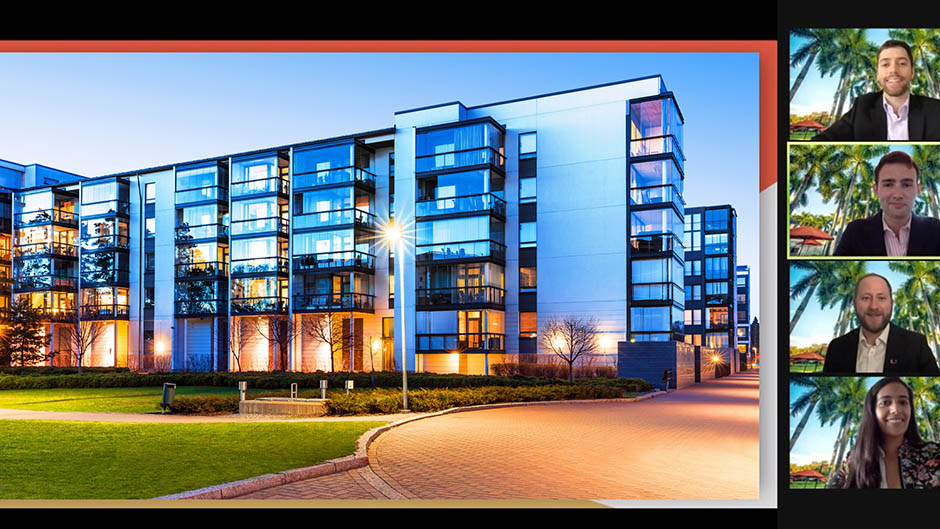Judges evaluated all submissions for financial soundness, concrete assumptions, and a measurable impact through social and sustainability features.
At the finals, held virtually in mid-April, six remaining teams showcased their visions to industry experts Robin Zeigler, senior executive vice president and COO of Cedar Realty Trust, Kevin Fitzpatrick, CEO of Spring Bay Properties, and Ken Hubbard, senior advisor at Hines.
The teams from the University of Pennsylvania Wharton, the University of Chicago Booth, and Miami Herbert presented the winning proposals and split the $25,000 prize money equally.
Wharton
With a proposition that the judges deemed the most commercially viable, including already lined up pre-leasing candidates, team members, MBA students Nicolle Lee, Vicky Plestis, Ross Shahinian, and undergraduate Maksim Sorokorenskii, proposed 17th Street Crossing, a mixed-use office building that would help invigorate business, workforce, and community development in North Philadelphia.A once thriving manufacturing center, the area has undergone decades of de-industrialization and economic effects that have caused higher barriers to jobs in education and healthcare, leaving a mostly low-wage job market heavily impacted by the COVID-19 pandemic. But the Wharton team recognized a spirit of renovation driven by strong community ties, a young and dynamic population, and anchor institutions like Temple University and Temple Hospital.
“We see this project as an early bet on an upcoming market, as well as a chance to set the stage for a new model of development that is inclusive of the community who lives there,” Plestis says.
To be centered amid transit, education, and healthcare hubs, the building would consist mostly of traditional office leasing, with additional square footage dedicated to flex office use—a new concept of flexible spacing that enables startups and growing firms to expand outward according to their needs. Key features would include a community assembly center, a retail café, and a rooftop garden to serve as an urban farming site open to the entire community and free wi-fi for today’s often remote worker.
Chicago Booth
Booth full-time MBA students Tom Voutsos and Dan Vollman proposed their Heroes Housing Condos plan, entailing the acquisition and renovation of five multi-family properties in the Austin neighborhood of Chicago.Austin, adjacent to Oak Park suburb and a 15-minute drive to the city’s downtown, carries elevated rates of poverty and crime in recent years, but the area has garnered increased attention from the local government and community organizations, prompting investments to trickle in. The Booth team seeks to stimulate the community’s upturn through housing with a pathway to homeownership for some of the over 1,800 health care workers who reside there.
“These workers are cornerstones in their community but currently are not property owners in it,” Voutsos explains. “They deserve housing options that match their preferences, are affordable, and provide the ability to create wealth.”
The renovated properties, with close proximity to Loretto Hospital, the largest employer in the neighborhood, would supply 83 units for initial leasing and eventual purchase to health care providers. Tenants would receive financial coaching to guide them towards improved finances and credit scores as well as to help them through the home buying process once they are ready.
Miami Herbert
The Miami Herbert team—recent MBA graduates James Farrar and Malak Benmassaoud, JD/MBA student Joshua R Polner, and MRED student Hunter Holtz— designed of Liberty Oasis, envisioned as a lively residential development to include a rooftop garden and green wall garage for newcomers and residents within Miami’s Liberty City neighborhood.As the city undergoes rapid population growth, which has only intensified during the pandemic, Liberty City is beginning to attract the attention of private developers who notice its physical demographic as a low flood-risk zone, a rarity in Miami-Dade County. In this environment, team members hope to attract new residents, but also prioritize long-time locals of the traditional neighborhood, comprised mostly of blue-collar, service workers, though also a significant number of young professionals eager for modern, affordable housing.
With 555 units, to be constructed in three phases spanning four years, Liberty Oasis would offer these target occupants market-rate rental options with accessible vital necessity amenities, including a supermarket, an urgent care center, a pharmacy, a dental office, a daycare, and a fast-casual restaurant.
The layout allows residents without a car to access common essentials without needing to commute, a strategic choice explains Farrar: “The more time that residents save, the more time that they can invest in themselves, whether through reading, education, or going to a career center.”
For all teams, the competition provided hands-on experience and a broadened understanding of the various dimensions of impact investing.
"We learned a ton through this process,” says Booth’s Voutsos. “The research required forced us to gain a wide breadth of knowledge that we didn't have before and truly understand the issues residents were facing at a community level.”
"Understanding the roots and current challenges of the North Philadelphia community were probably the most important factors in guiding our vision," adds Wharton’s Shahinian.
Meanwhile, competition coordinator and Miami Herbert Academic Director of Real Estate Programs Professor Andrea Heuson describes the contest as rewarding for the students and faculty alike. “Every year, the experience is really fun,” she says, “and it gets harder and harder to pick the final projects.”

